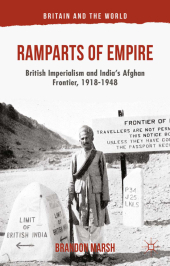 Neuerscheinungen 2015Stand: 2020-02-01 |
Schnellsuche
ISBN/Stichwort/Autor
|
Herderstraße 10
10625 Berlin
Tel.: 030 315 714 16
Fax 030 315 714 14
info@buchspektrum.de |

B. Marsh
Ramparts of Empire
British Imperialism and India´s Afghan Frontier, 1918-1948
1st ed. 2015. 2015. xv, 292 S. 216 mm
Verlag/Jahr: SPRINGER PALGRAVE MACMILLAN; PALGRAVE MACMILLAN UK 2015
ISBN: 1-349-47678-1 (1349476781)
Neue ISBN: 978-1-349-47678-7 (9781349476787)
Preis und Lieferzeit: Bitte klicken
This cultural and political study examines British perceptions and policies on India´s Afghan Frontier between 1918 and 1948 and the impact of these on the local Pashtun population, India as a whole, and the decline of British imperialism in South Asia.
Introduction 1. The North-West Frontier: Policies, Perceptions, and the Conservative Impulse in the British Raj 2. The North-West Frontier and the Crisis of Empire, 1919-1923 3. A Cigarette in a Powder Magazine: The Frontier, Nationalism, and Reform, 1919-1930 4. ´A Considerable Degree of Supineness´: Nationalism and The British Administration, 1928-1930 5. ´These Infernal Khudai Khidmatgaran´: Defining and Repressing Frontier Nationalism, 1930-1932 6. ´The Forbidden Land´: The British, Frontier Nationalism, and Congress, 1931-1934 7. ´If the Ramparts Fall, the City must Fall also´: The Frontier and Indian Constitutional Reform, 1930-1939 8. Tribal Policy and its Discontents, 1930-1939 9. The North-West Frontier and the Second World War, 1939-1946 Conclusion: The End of British Rule and the Frontier Legacy
´At the dawn of the twentieth century, British grand strategists believed that ´in all the British Empire there is but one land frontier on which war-like preparations must ever be ready. It is the north-west frontier of India´. In Ramparts of Empire, Brandon Marsh examines the subsequent push-and-pull between such seemingly immutable assumptions on the one hand, and new thinking born of new times on the other. This cogent and timely study demonstrates that events on British India´s Afghan frontier developed, and must be understood, in the frame of ´all-India´ politics, however much colonial officials imagined the region to be a place apart from the rest of South Asia. Policy-minded readers will find an instructive precedent to twenty-first century debates over autonomy versus integration, and over containment versus counter-insurgency, in the borderlands of Afghanistan and Pakistan.´
-Peter John Brobst, Associate Professor of History, Ohio University
"Ramparts of Empire provides an important corrective to our understanding of India´s Afghan frontier by pulling together the political, cultural, and military dimensions of the frontier´s history in an impressive way, and by placing the frontier in the context of all-India politics and nationalism. It is based on new and extensive archival research in India, the UK, and US that goes well beyond the old familiar sources. It is also beautifully written.´ James Onley, Editor of the Journal of Arabian Studies, author of The Arabian Frontier of the British Raj and Senior Lecturer in Middle Eastern History at the University of Exeter, UK.
´British and Russian players of the Great Game in Asia competed for the Northwest Frontier of India. In Ramparts of Empire, Brandon Marsh effectively deals with the area itself, its Pathan tribes, its British rulers, and the end of the game, when Mountbatten brought the British side of it to a close. This work demonstrates the continued importance of the Northwest Frontier in the final decades of the British Raj. This is a compelling account of both the mystique and the realities of the Northwest Frontier.´ - Wm. Roger Louis, University of Texas, USA


